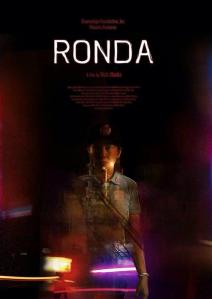RONDA (Nick Olanka, 2014)
New Breed Entry: Cinemalaya 2014
As her first vehicle for her foray into independent cinema, RONDA provides a lot of potential for Ai Ai De Las Alas to discover her artistry, and prove that she can do more than provide laughter. Her character, a policewoman patrolling the dark streets of Manila allows her to grow a lot as an actress. Much of the film's scenes takes place at a safe distance; we observe as the patrol car roam around Recto Street and Quezon Boulevard while Ai Ai and her partner, played by Carlos Morales discuss things ranging from the mundane, like Morales's character's sexual escapades with his numerous women, to the bizarre, like the story about ghosts in the apartment. However, the frame is never boring. Even when there is nothing happening onscreen, there is something happening. A reflection, a stir of emotion, a foreboding- all part of director Nick Olanka's master plan.
Perhaps, Olanka wants us to be observers of the routine, of the redundancy of procedure, instead of letting us see through the eyes of the characters. Through this, we are able to judge the facts more objectively. This is the same technique that Soderbergh employed in THE GIRLFRIEND EXPERIENCE, but with lesser luck. For RONDA, the partial use of the voyeuristic perspective yields positive results.
Credit cinematographer Albert Banzon for the gorgeously lit shots of a city enveloped in darkness, and yet all of a sudden all the filth and noise and danger inherent to the city becomes attractive, even inviting. The lighting beckons us to partake into the patrol ourselves. The shots are so well-mounted you remember the lighting, the framing, and the blocking in your head long after the film. As I would refer to it, very "MANILA BY NIGHT", in a good way.
The story, a collaboration between Olanka, Adolfo Borinaga Alix, Jr. and Jerome Zamora, takes some direct political potshots, mostly at Gloria Arroyo, through a commentary playing on AM radio as Ai Ai makes her rounds. As a matter of fact, Ai Ai's character is SPO3 Arroyo, a namesake to the controversial ex-president. As to how a connection between the two exists seems blurry at first, but coincidence it sure is not.
Gloria Arroyo, the ex-president is portrayed in the film as a woman who may finally be getting what she deserves after the Aquino administration runs after her for the NBN-ZTE deal, the fertilizer scam, and so on. Meanwhile, Arroyo the lowly grunt of a cop who is prey to a system of injustice contemplates her misfortunes despite her honesty and dedication to service. We see her efforts to fulfill her cop duties reduced to ash, which really makes a mockery of how the law actually works in this country- a series of favors and parasitism.
Moreover, Arroyo the cop reflects on her credentials as a mother. When her son (Julian Trono) leaves home and refuses contact for days, Arroyo is consumed by both guilt and fear, guilt as to why her son would keep secrets from her, and fear that her son might be in danger. It could be that the son is afraid of the mother because the mother is such a straight-laced cop that she might not tolerate the misgivings of even her own flesh and blood.
And so, Arroyo patrols the streets and continues to do her job, when all the while her mind is preoccupied with simply finding her son.
A great use of analogy (and foreboding, as well) can be found in the nature of the story's characters. Carlos Morales's character is a womanizer, and Ai Ai's Arroyo will also commit an act that might be considered unthinkable, and this chain of events would later on reflect a key event in the movie.
Also, there is a parallelism between Arroyo, who longs for her son and simultaneously questions her worth as a mother, and the cigarette lady played by Perla Bautista, who shares her grievances on motherhood.
While obviously a low-key drama, the film is not short on brief fits of humor: see the film also for Angeli Bayani's brilliant cameo as a reporter, who represents the story's take on sensationalism.
Modern society has now been redefined, and this is an age where the women play the role of what would usually have been played by men. Take RONDA for instance, where in lieu of a muscular hero running after thieves, battling the system, and saving the day we have an imperfect heroine running after thieves, battling the system and wishes she could save the day, but couldn't. The tables have long turned. This is the reality, and RONDA captures it beautifully.
The true power of RONDA comes from the story of a woman who has so much power in her arsenal, but even so there are some things she has no control of. Ai Ai De Las Alas renders a nuanced, stripped down performance of an ordinary cop and gives her an extraordinary focus by letting us peer into Arroyo's psyche in moments of silence.
And for those complaining about the laborious tracking shots of nighttime patrol, you should be in an actual patrol yourselves. And once there in the patrol car, commence complaint on the monotony of everyday life.
RATING: 4/5


Comments
Post a Comment